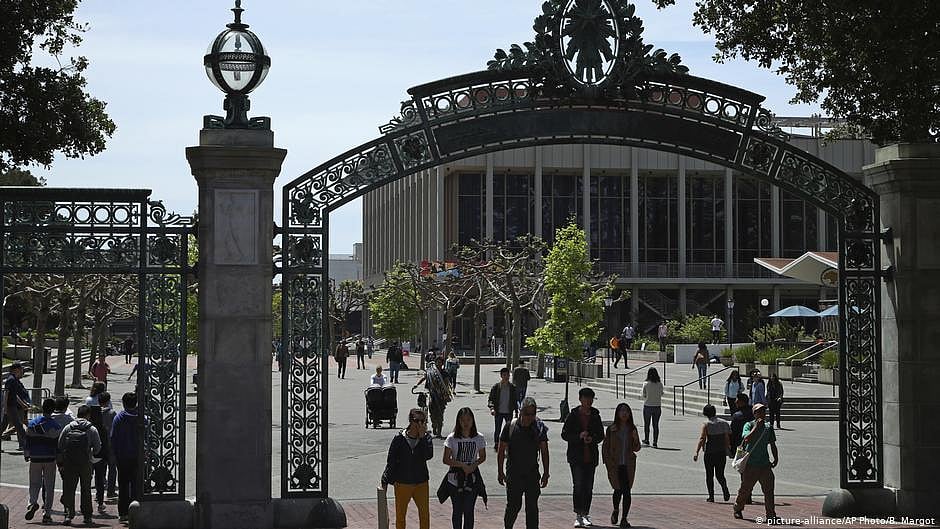World
US proposes major overhaul of student and exchange visa rules
Proposal caps admissions at 4 years, cuts post-study grace period, and tightens transfer rules, impacting Indian students

Citing national security concerns and fraud prevention, the Donald Trump administration has proposed sweeping changes to the admission rules for F (academic students), J (exchange visitors), and I (representatives of foreign information media) visa holders, ending the long-standing practice of “duration of status” and replacing it with fixed periods of authorised stay.
The move, if enforced, could significantly impact tens of thousands of Indian students and professionals in the United States. The Department of Homeland Security is set to publish this proposal in a federal notification on Thursday, 28 August, initiating a 30-day response period for the public.
“Unlike most non-immigrant classifications, which are admitted for a fixed time period, aliens in the F, J, and most I classifications are currently admitted for the period of time that they are complying with the terms and conditions of their non-immigrant classification,” DHS said in its notice.
Under the plan, visa holders would have to seek extensions directly from DHS if they wished to remain beyond their initial period. Officials said the change would bring these categories in line with other visa classes and allow immigration officers to better enforce compliance.
The proposed rule limits F and J admissions to a maximum of four years, shortens the post-completion grace period for students, and imposes stricter restrictions on transfers and programme changes. For I visa holders, admission would be capped at 240 days, with possible extensions. The DHS said the move would impose additional costs on schools, sponsors and visa holders, but stressed that it would safeguard programme integrity.
Published: undefined
The change would force Indian students—who make up one of the largest foreign student communities in the US—to periodically apply to DHS for extensions if their studies or research extend beyond the fixed admission period. DHS insisted the measure would give immigration officers “an effective mechanism to periodically and directly assess whether these non-immigrants are complying with the conditions of their classifications and US immigration laws”.
The move comes at a time when the number of Indian students in America has reached record highs. In fiscal 2023, Indians accounted for more than 270,000 of the 1.6 million F-1 visa admissions. The new rules could raise uncertainty over graduate and doctoral programmes, many of which take longer than four years to complete.
Other proposed provisions include:
Cutting the grace period after study from 60 to 30 days
Prohibiting graduate students from switching programmes mid-course
Capping language-training students at 24 months
Requiring biometric data with extension applications.
Visa Type
Current System
Proposed Changes
F (Academic Students)
Admitted for "duration of status" (D/S) with no fixed end date, plus 60-day grace period.
Fixed period up to 4 years, extension required via Form I-539, 30-day grace period.
J (Exchange Visitors)
Admitted for D/S, plus 30-day grace period, extensions by sponsor.
Fixed period up to 4 years, extension via Form I-539, 30-day grace period.
I (Foreign Media)
Admitted for D/S (90 days for PRC), no fixed end date.
Fixed period up to 240 days (90 for PRC), extension via Form I-539.
Based on the 2023 data, the rule could impact over 1.6 million F admissions, 500,000 J admissions, and 32,000 I admissions annually.
Through this proposal, the Trump administration aims to address vulnerabilities exposed by rising numbers of admissions and past abuses, including those highlighted post-9/11.
"The significant increase in the volume of F academic students, J exchange visitors, and I foreign information media representatives poses a challenge to the Department's ability to monitor and oversee these non-immigrants while they are in the United States," DHS said.
Published: undefined
Key changes include requiring extensions of stay (EOS) for those needing more time, with DHS explaining: "Non-immigrants who would like to stay in the United States beyond their fixed date of admission would need to apply directly to DHS for an extension of stay (EOS)."
The proposal emphasises alignment with statutory intent for temporary stays: "For F and J visa holders, the Immigration and Nationality Act (INA) specifically states that aliens must have a residence in a foreign country which they have no intention of abandoning and seek to enter the United States temporarily."
DHS references historical context and security mandates: "The events of 9/11 highlighted the potential for abuse of the student visa. In the wake of 9/11, a Homeland Security Presidential Directive titled, ‘Combating Terrorism Through Immigration Policies’ directed, among other things, that a programme be developed to track the status of foreign students."
The proposal would impose fixed periods up to four years for F and J programmes, with restrictions on programme changes: "Setting the authorized admission and extension periods for F and J non-immigrants up to the programme length, not to exceed a 4-year period."
For I classifications, it proposes: "Replacing D/S for I non-immigrants with admission for a fixed time period until they complete the activities or assignments consistent with the I classification, not to exceed 240 days."
DHS anticipates costs but stresses benefits: "Over a 10-year period of analysis, DHS estimates the proposed rule would have annualized costs ranging from $390.3 million to $392.4 million."
Public comments are invited until 30 days after publication, with DHS stating: "DHS encourages all interested parties to participate in this rulemaking by submitting data, views, comments, and arguments on all aspects of this notice of proposed rulemaking." This shift could impact over 1.6 million F admissions, 500,000 J admissions, and 32,000 I admissions annually, based on 2023 data cited in the notice of proposed rulemaking.
(Courtesy: 5wh.com)
Published: undefined
Follow us on: Facebook, Twitter, Google News, Instagram
Join our official telegram channel (@nationalherald) and stay updated with the latest headlines
Published: undefined